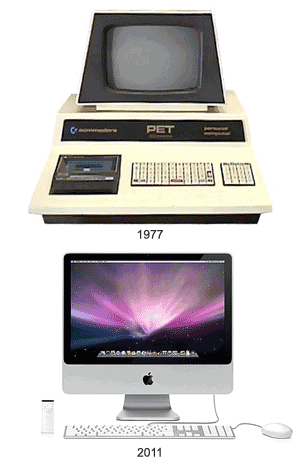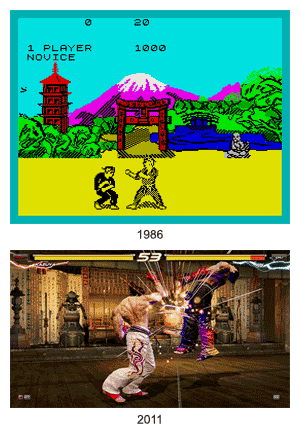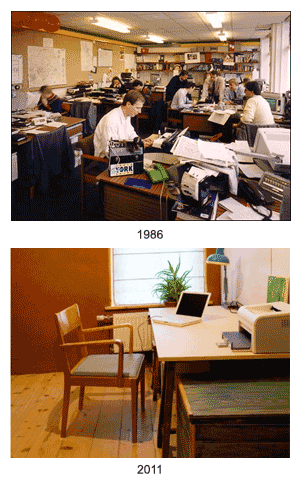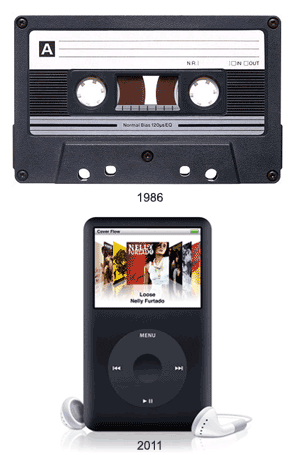How times change
Another week, another scandal. The iPhone 4 doesn’t work if you hold it in a weird, unnatural way. Twitter went down for ten minutes. Facebook’s privacy settings are a bit hard to work out. Calamity!
Of course, we should expect technology products to improve over time. But the incremental, today-tomorrow perspective is sometimes just too narrow. If we take a longer view, it’s clear that the technology we have today is absolutely amazing. So step back 25 years with me and take a look at what’s changed…
Computers
It blows my mind that my four-year-old daughter can already use a computer. As I type this, it dawns on me that universal computer ownership, probably from around the age of six, will be the norm for her generation. My hardline determination not to allow her a TV in her room will be irrelevant, since every type of media will be right there on her laptop. Or beamed directly into her little brain.
 I didn’t even see a computer until I was eight. Even then, to have a computer in the home was very unusual – eccentric really. The machine I saw was my friend’s dad’s Commodore PET – a contemporary of the Apple II and the TRS-80 that launched in 1977. The top-of-the-range model shipped for $795, which in today’s money would be around $2870 (£1817). That’s quite a lot for a machine with 8k of RAM (that’s kilobytes, not megabytes or gigabytes), a 1Mhz processor (i.e. one two-millionth of the power of the MacBook I’m using to write this) and a tape drive for storing your data. (By 1986, we had a Sinclair ZX Spectrum in our own house – discussed under ‘Games’ below.)
I didn’t even see a computer until I was eight. Even then, to have a computer in the home was very unusual – eccentric really. The machine I saw was my friend’s dad’s Commodore PET – a contemporary of the Apple II and the TRS-80 that launched in 1977. The top-of-the-range model shipped for $795, which in today’s money would be around $2870 (£1817). That’s quite a lot for a machine with 8k of RAM (that’s kilobytes, not megabytes or gigabytes), a 1Mhz processor (i.e. one two-millionth of the power of the MacBook I’m using to write this) and a tape drive for storing your data. (By 1986, we had a Sinclair ZX Spectrum in our own house – discussed under ‘Games’ below.)
Computers back then were so basic, even the commercial software available was not that far beyond the capabilities of the self-taught bedroom programmer. The computer’s architecture and language were eminently knowable, if you put the hours in – as I did, teaching myself Z80 machine code to write games on my Spectrum. Hobby computing was like entering an idealised version of your own head: a completely rational, self-consistent domain that operated according to strict rules and obeyed your every command.
Now, with the internet and social media, things are totally different. No longer is the computer a discrete, self-contained, internal phenomenon. It’s interconnected, no longer sufficient in and of itself. And what a terrible loss that is. What was once a chance to enter a contemplative, ascetic space has become just another window on banal human nature. Convinced that sociability is better than solitude, we willingly fling ourselves headlong into fragmentation and triviality. (On the plus side, the computers are admittedly a bit more powerful and easier to use.)
What will the experience of computing will be like in another 25 years? Presumably miniaturisation, connectivity and convenience will deliver totally new experiences, but I can’t imagine what they’ll be like – just as nobody could have imagined today’s technology in the days of the PET.
Games
It’s hard for me to read the games journalism of today without a creeping feeling of ‘they don’t know they’re born’. A towering achievement such as Grand Theft Auto IV, which recreates New York crime movies with stunning accuracy, has been described in some quarters as a disappointment. Half-Life 2, which allows the player to enter an incredibly detailed imaginary world, is criticised for the slight slowdown in its graphics engine on the PlayStation 3. In my opinion, these gaming experiences are nothing short of incredible. But I suppose the context for contemporary criticism is the gaming scene of today, not the whole history of games.
 In 1986, I travelled to WHSmith in Birmingham city centre with my friends to buy games for our ZX Spectrums (Spectra?). They were available on standard cassette tapes, which we acquired when finances allowed and brought home, eager to load them up and have a go.
In 1986, I travelled to WHSmith in Birmingham city centre with my friends to buy games for our ZX Spectrums (Spectra?). They were available on standard cassette tapes, which we acquired when finances allowed and brought home, eager to load them up and have a go.
The trouble started right there. Often, the tape player would not be up to the job and the game would fail to load. Even a successful load took around five minutes, and the Spectrum would sometimes crash right at the very end of the process, obliging you to start all over. Spending an hour, or an afternoon, just trying to load a game was by no means unusual.
Things weren’t that much better once the game had loaded. Many titles were developed by amateurs working alone – enthusiasts not so different from the people who bought their creations. The games had no playtesting in the modern sense, so they were incredibly difficult and unbalanced, or in some cases actually impossible to complete. We loved them all the same, but in retrospect they were poor.
So there’s really no comparison. But one thing is objectively worse today: the imagination and vision that goes into games. On the Spectrum, a lone auteur with a decent idea, however ‘out there’, could turn it into a game. As a result, some absolutely bonkers concepts made it on to those metal shelves in WHSmith – and they sold. (ID, Schizoids and Pyjamarama spring to mind.)
Today, games are developed by huge teams backed by major investments, and it’s rare that a single producer will be given final cut to pursue their own personal vision. Apart from a few mavericks who’ve slipped through the net, like Hideo Kojima and Suda 51, corporate conformity rules the day. But as more cheap-to-produce download-only games enter the fray, we’re seeing imagination reassert itself as a driving force, resulting in games that can make a good case for being considered works of art, such as Braid.
Work
I honestly find it hard to imagine how a freelance writer or editor would have operated in 1986. In terms of the actual hands-on work, I guess it would have been electric typewriter, or perhaps a very early (pre-Windows) PC or Amstrad word processor. However, having and using a computer would have been the exception rather than the rule – almost impossible to imagine today.
 Transferring files to and from clients, if it happened at all, would have been on floppy disk, possibly the old 5.25” variety that didn’t even have a plastic case to protect them, just a paper envelope. There would have been a lot of phone conversations and face-to-face meetings, perhaps supported by handwritten, typed or printed material transmitted via fax and post. Finding work would have been a combination of personal referral, listings in paper directories and perhaps press advertising.
Transferring files to and from clients, if it happened at all, would have been on floppy disk, possibly the old 5.25” variety that didn’t even have a plastic case to protect them, just a paper envelope. There would have been a lot of phone conversations and face-to-face meetings, perhaps supported by handwritten, typed or printed material transmitted via fax and post. Finding work would have been a combination of personal referral, listings in paper directories and perhaps press advertising.
A quarter of a century later, the freelancer’s life has been utterly transformed. Email dominates, perhaps even dictates, the working day, becoming the medium through which nearly every key project milestone is managed. I have several clients to whom I’ve never even spoken, let alone met face-to-face. Jobs arrive as email attachments, get edited or rewritten, and emailed back with a PDF invoice.
As far as I can see, this must have dramatically reduced the admin and hassle overhead in the freelancer’s life, allowing for far more productive hours in every day. However, whether the hours are actually used productively (as opposed to, say, being frittered away on Twitter) is another question. And the trade-off is a bitty, fragmented working day that’s as much driven by technology as supported by it. But overall, I’ll take the 2011 version of freelancing over the 1986 vintage.
Another big difference is in the social dimension. Workplace culture probably hasn’t changed that much in 25 years, except that nobody can smoke and (some) men have learned to do their own typing. But for the freelance, a whole new world has been opened up by social media.
Whereas the 1986 freelancer presumably got their professional socialising on the phone, or perhaps at an occasional lunch, the 2011 version can be fully connected with a worldwide network of people doing exactly the same sort of work at exactly the same time – a perfect peer group. Since some of them are technically competitors, this can sometimes feel strange, as I documented in Tweeting with the enemy. But overall, it’s surely a step forward to have this kind of network there when you need it.
Music
In 1986, I took the Cross-City Line to Redditch Kingfisher Centre to browse the vinyl in Our Price. Unless I’d heard a particular track on the radio, I had no idea what I was buying, and I’d buy a lot of albums that I ended up not liking that much. Good music felt hard to find – press reviews were some help, but they could still be wildly unreliable, with much depending on the personality of the reviewer. Many older albums were deleted once they became slow sellers, meaning a great deal of older music was difficult or impossible to obtain. Even if you did get hold of vintage albums, you had to contend with a physical format (vinyl or tape) that was prone to damage and decay. Nothing lasted forever.
 Exercising some editorial control over your collection by making mixtapes was risibly labour-intensive. I would painstakingly piece them together on my brown plastic Tandy music centre, working that pause button mercilessly, only to listen back in frustration when I realised that an impulsively offbeat selection during the compilation process had made the final sequence unlistenable. There was no alternative but to redo it from the point where my dropping science had gone awry.
Exercising some editorial control over your collection by making mixtapes was risibly labour-intensive. I would painstakingly piece them together on my brown plastic Tandy music centre, working that pause button mercilessly, only to listen back in frustration when I realised that an impulsively offbeat selection during the compilation process had made the final sequence unlistenable. There was no alternative but to redo it from the point where my dropping science had gone awry.
Fast-forward to 2011. I rarely buy an entire album, since I can preview all the tracks on iTunes and just get the ones I want (or think I want, based on a brief preview). The iTunes store is so comprehensive, and the Genius algorithm so uncannily powerful, that I can find great music in any genre I want, from any period I want, whenever I want. In fact, rather than agonising for hours over a single purchase like I did in Our Price, I often avoid hanging out at the iTunes store because I know I’ll end up buying loads of tracks. (For a pictorial interpretation of the way music consumption has changed, have a look at this.)
Mixtapes, once such a chore, have become playlists – surely the way to enjoy music in 2011. Some of mine are real labours of love – huge, pulsating, ever-growing affairs that have to be subdivided to be usable. (My ‘chill’ playlist lasts 6.6 days, making it too long for most listening occasions.) Playlists let rarely-listened-to album tracks come into their own in a whole new context, revealing the true richness and depth of your music collection.
The music itself is better too. The reason is obvious. The retro-sounding acts of today (Fenech-Soler, Empire of the Sun, Delphic, Little Boots, Kissy Sell Out, La Roux, Twin Shadow) can riffle through the sonic After Eight box of the 80s without leaving their bedrooms, expertly mixing sounds, styles and atmospheres to create, not lifeless pastiches, but brilliantly eclectic music that actually surpasses the artists it quotes from. It’s a far cry from the ‘indie dance’ of the early 1990s, with its lumpen appropriation of funk and disco tropes by acts who’d had to mine their source material the hard way.
Mixed blessings
Has technology improved life? At the micro level, the answer must be yes. Each individual task is easier and quicker, each leisure activity undeniably enhanced. But the sum total of all these improvements sometimes seems negative – too much stuff, all at the same time, much more quickly, and not enough attention to go round. We can do jobs more easily, but we’re forgetting how to concentrate. We get things more easily, but we value them more lightly. Such is progress, perhaps.
Comments (5)
Comments are closed.
I can’t believe all those pictures from the ancient past are in colour!
We’ve never had it so good, in terms of technology. And much like you, I’d much rather have the distraction of Twitter than go back to the way life was in 1986. Although in my case, that’s probably because in 1986 I was still looking forward to the brave future of solid food and verbal communications…
Hi Tom,
Nice post. Thanks for taking me back to the days when I used to make platform games on my ZX Spectrum as a girl-shy 12 year old. Surprised I can still see, today given the hours I spent in a darkened bedroom in front of a TV screen.
Regarding your last paragraph I think technology has improved life itself in some ways, but certainly not others. For example, technology has unmistakably improved our general health well-being, ability to cure once-terminal diseases and longevity (although the latter may be a downside for some!)
However, technology, as you allude to in your opening gambit, does not necessarily improve our ability to enjoy life or even cherish it more. The amount of irate tweets in one’s stream about faulty wi-fi on a home modem or dodgy bluetooth on a certain brand of mobile is testament to that. Unfathomable – and yes, I’ve been guilty of screaming at my Mac on several occasions, which on reflection, I really must get a grip on what’s important.
Yep, technology has undoubtedly made work easier, but we mustn’t lose sight of WHY we work. Surely it’s to not only feed and nurture our families but also to enjoy spending the time with our partners, children and relatives within the societies we chose to live. Whilst we have to be grateful for fire, the wheel and speaking to loved ones in other countries over the Internet, the ability to enjoy life should always remain that little bit separate from technology.
Mind you, I don’t know where I would have been now without my ZX Spectrum!
[…] This post was mentioned on Twitter by Andrew Nattan, Larner Caleb and Bypest Environmental, Tom Albrighton. Tom Albrighton said: New post: How times change http://goo.gl/fb/F4TBH […]
Oh boy. Lots to say from the perspective of a 50+ copywriter. But I’m uncharacteristically busy so this rich seam will have to wait. Two words, though (OK, an abbreviation and a word): IBM Golfball.
Blimey some of those are a blast from the past. I remember my first computer was an Acorn Electron that had a tape drive. If I wanted to play a game I had to set the tape going, go and have tea, head back to the computer and if I was lucky it was half way through loading.
Thanks to the ever changing world of technology I have a computer studies O level and A level which are of no use to man nor beast. My trusty BBC Master 128 got me through both exams in the days when floppy discs were floppy – ah, happy days!
But I dare say it won’t be long before the machine I’m typing this on becomes obsolete – what will the future bring next? The mind boggles.
P.S. Feeling old is taking your kids to the science museum only to see most of your childhood toys displayed as exhibits.